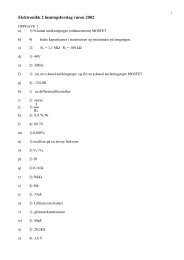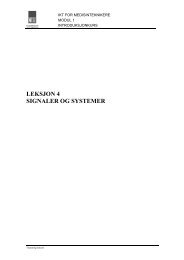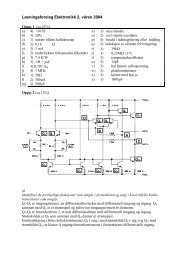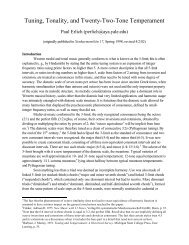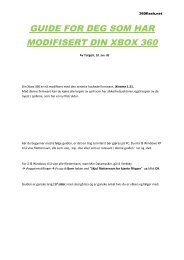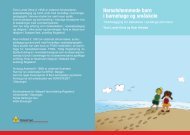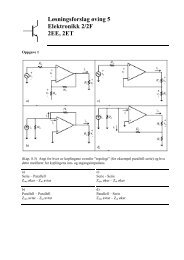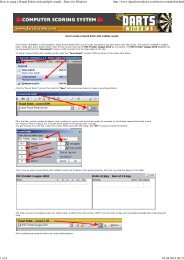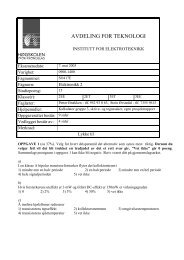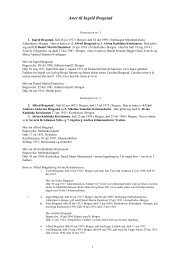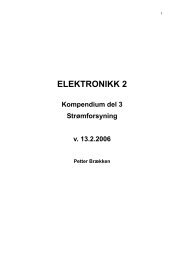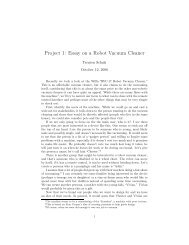The Online World resources handbook
The Online World resources handbook
The Online World resources handbook
Create successful ePaper yourself
Turn your PDF publications into a flip-book with our unique Google optimized e-Paper software.
Selected online services http://home.eunet.no/~presno/bok/v1.html<br />
Vendor of packet data services with local operations in many countries around the<br />
world.<br />
Internet<br />
<strong>The</strong> name comes from "inter networking," which is the process of connecting multiple<br />
host computers and their associated networks together to create a larger network.<br />
What started as ARPANET, was by July 1996 a large group of over 134,000<br />
interconnected independent networks in 175 countries supporting mail, news, remote<br />
login, file transfer, and many other services (source: http://www.nw.com). All<br />
participating hosts use the TCP/IP protocol.<br />
While electronic mail and the <strong>World</strong> Wide Web are the net's most popular<br />
applications, users also have access to ftp and telnet. Ftp gives interactive access to<br />
remote computers for transferring files. Telnet gives access to a remote service for<br />
interactive dialog. You can telnet several bulletin boards through Internet, like<br />
telnet://conrad.appstate.edu. (Login as "info")<br />
It is not possible to calculate the number of interconnected networks any more, but<br />
by July 1997, hosts in 214 countries provided net connectivity.<br />
<strong>The</strong>re are other major wide area networks, such as the BITNET and DECnet<br />
networks that are not based on the TCP/IP protocols and are thus not part of the<br />
Internet. However, it is possible to communicate between them and the Internet via<br />
electronic mail because of mail gateways that act as "translators" between the different<br />
network protocols involved. See <strong>The</strong> Matrix below.<br />
<strong>The</strong> number of hosts grew from 213 in 1981, through 313,000 in 1990, to<br />
93,047,785 in July, 2000. (Source: Internet Software Consortium). A host used to be a<br />
single machine on the net. <strong>The</strong> definition has changed due to virtual hosting, where a<br />
single machine acts like multiple systems (and has multiple domain names and IP<br />
addresses).<br />
<strong>The</strong> number of users is claimed to double every year. In January 1994, the<br />
Internet Number FAQ estimated some 16 million users. Two years later, Matrix News<br />
estimated 36 million users of computers who could distribute information by interactive<br />
TCP/IP services (like WWW, and FTP), and 57 million users who could access<br />
information by interactive TCP/IP services.<br />
By June 1998, the Internet had an estimated 129.5 million users, according to Nua<br />
Internet Surveys. By November 1997, the number was 86 million users.<br />
For a different view of the figures, check Global Internet Statistics. <strong>The</strong>y<br />
estimate the number of each language population on the Internet (native speakers): those<br />
who have access to the Internet on a worldwide scale (that is, who have email access) or<br />
to the Web. <strong>The</strong>y classify by languages instead of by countries, since people speaking<br />
the same language form their own online community no matter what country they<br />
happen to live in.<br />
Already by August, 1991, over half the registered networks on Internet were<br />
commercial.<br />
In addition, private enterprise networks have an estimated 1,410,000 hosts using<br />
TCP/IP (Source: <strong>The</strong> Internet Demographic Survey, January 1994.) <strong>The</strong>se offer mail<br />
exchange with the Internet, but not services such as Telnet or FTP to most parts of the<br />
Internet, and are estimated to have some 7.5 million users.<br />
One important feature of the Internet is that no one is in charge. <strong>The</strong> Internet is<br />
essentially a voluntary association. Somehow it all works.<br />
Some of its direction comes from a group of volunteers called the Internet Society<br />
run more like a council of elders than a business.<br />
No one organization collects fees from Internet users or networks. Each user and<br />
service pays its own way. <strong>The</strong>re are rarely any additional charges for sending and<br />
receiving electronic mail (even when sending to other networks), retrieving files, or<br />
reading Usenet Newsgroups.<br />
For more on the Internet, check out the sources listed at the end of Appendix 6.<br />
Statistics<br />
6 of 11 23.11.2009 15:49



